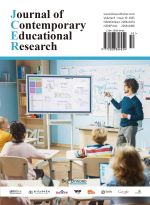Abstract
In an era defined by complex, interconnected challenges like climate change, pandemics, and resource depletion, the traditional siloed approach to science education is proving increasingly insufficient. Interdisciplinary project-based learning represents a promising path forward in science education, fostering integrated and holistic learning experiences that move beyond isolated subject learning. Grounded in philosophical ideas of holism, pragmatism, constructivism, and transcendentalism, this article presents a case project illustrating the practical application of interdisciplinary project-based learning. This project engages students in integrating concepts from biology, chemistry, earth science, engineering, and social studies. Through phased activities—research and planning, data collection, implementation, and presentation—students develop a decent understanding of real-world problems while fostering skills in collaboration, problem-solving, and a sense of civic responsibility. Additionally, strategies are proposed to navigate the challenges associated with implementing interdisciplinary project-based learning, including aligning projects with standards, investing in professional development, leveraging community resources, and building support from stakeholders.
References
National Research Council, 2013, Next Generation Science Standards: For States, By States, The National Academies Press, Washington, DC.
Derrick E, Falk-Krzesinski H, Roberts M, et al., 2011, Facilitating Interdisciplinary Research and Education: A Practical Guide, viewed June 18, 2025, https://www.aaas.org/resources/facilitating-interdisciplinary-research-and-education-practical-guide
Caruana L, 2017, Holism and the Understanding of Science: Integrating the Analytical, Historical and Sociological, Routledge, London.
Kuhn T, 1997, The Structure of Scientific Revolutions. University of Chicago Press, Chicago.
Weber M, Esfeld M, 2004, Holism in the Sciences, Encyclopedia of Life Support Systems Publishers, Abu Dhabi.
Dewey J, 1998, The Essential Dewey, Volume 1: Pragmatism, Education, Democracy (Vol. 1), Indiana University Press, Bloomington.
Waite-Stupiansky S, 2022, Jean Piaget’s Constructivist Theory of Learning, in Cohen LE, Waite-Stupiansky S, (eds), Theories of Early Childhood Education, Routledge, 3–18.
Gura P, 2008, American Transcendentalism: A History, Hill and Wang, New York.
Buell L, Cramer J, Marshall M, 2016, A Modern Lyceum: Thoreau, Transcendentalism, and Education in the 19th Century and Today. The Concord Saunterer, 24: 133–152.
Warr M, West R, 2020, Bridging Academic Disciplines with Interdisciplinary Project-Based Learning: Challenges and Opportunities. Interdisciplinary Journal of Problem-Based Learning, 14(1): 1–22.
Anderson J, 2010, Interdisciplinary Project-Based Learning Leads to Success. Tech Directions, 70(4): 20–21.
MacLeod M, Van der Veen J, 2020, Scaffolding Interdisciplinary Project-Based Learning: A Case Study. European Journal of Engineering Education, 45(3): 363–377.
Demirel M, Coskun Y, 2010, Case Study on Interdisciplinary Teaching Approach Supported by Project-Based Learning. The International Journal of Research in Teacher Education, 2(3): 28–53.
